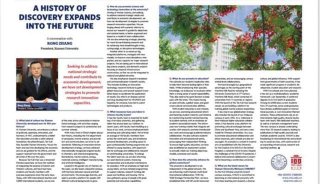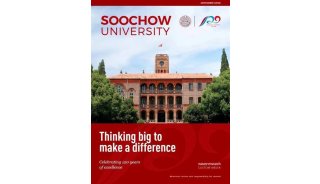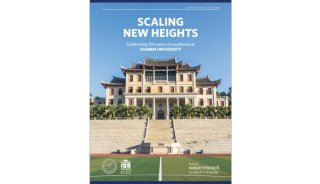Nature发布兰州大学110周年校庆专刊
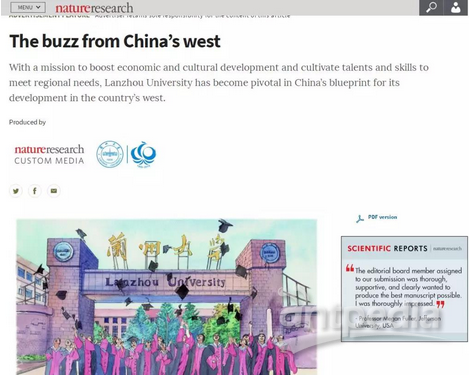
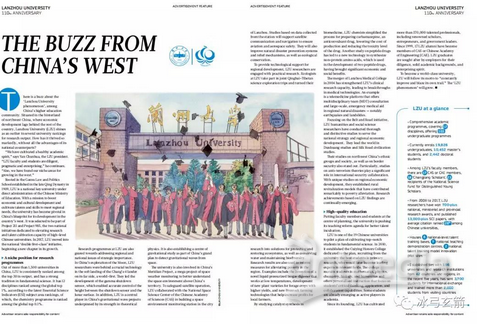
9月3日,顶级学术期刊《自然》(Nature)发布兰州大学110周年校庆专刊,以“The buzz from China’s west”为题介绍兰州大学的历史及发展,以“Blazing a trail”为题发布了对兰州大学校长严纯华的专访,还分别介绍了兰州大学生命科学、大气科学、医学、草业科学、核科学、物理学等学科的发展。
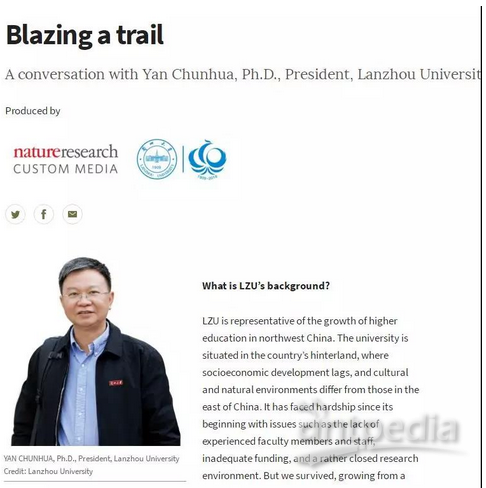
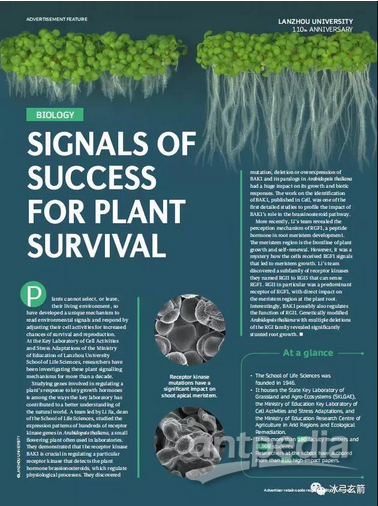
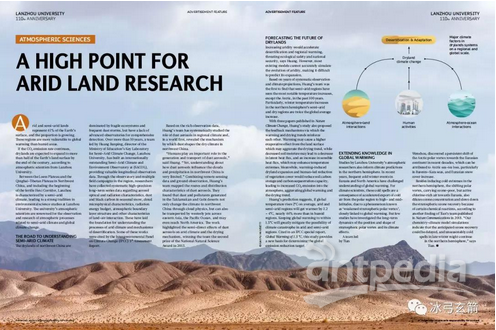
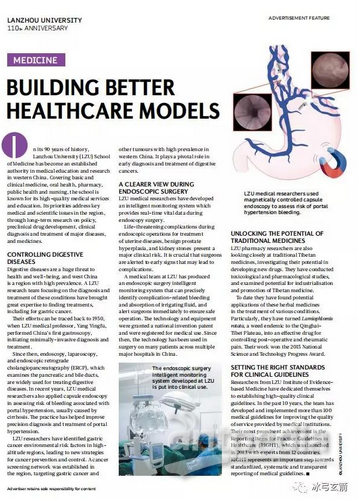
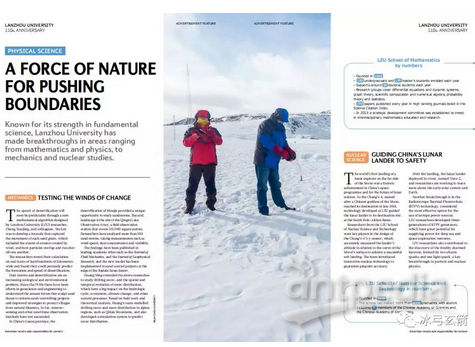
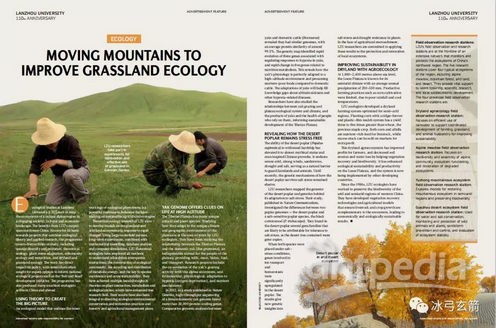
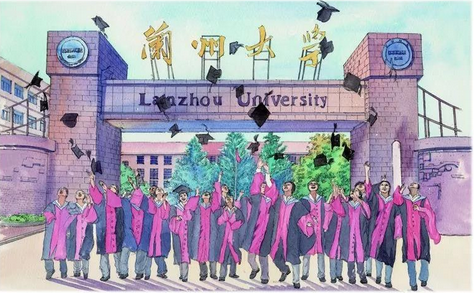
The buzz from China’s west
With a mission to boost economic and cultural development and cultivate talents and skills to meet regional needs, Lanzhou University has become pivotal in China’s blueprint for its development in the country’s west.
There is a buzz about the ‘Lanzhou University phenomenon’, among China’s higher education community. Situated in the hinterland of northwest China, where economic development lags behind the rest of the country, Lanzhou University (LZU) shines as an outlier in several university rankings for research output. How has it thrived so markedly, without all the advantages of its national counterparts?
“We have cultivated a healthy academic spirit,” says Yan Chunhua, the LZU president. “LZU faculty and students are diligent, pragmatic and enterprising,” he continues. “Also, we have found our niche areas for growing in the west.”
Rooted in the Gansu Law and Politics School established in the late Qing Dynasty in 1909, LZU is a national key university under direct administration of the Chinese Ministry of Education. With a mission to boost economic and cultural development and cultivate talents and skills to meet regional needs, the university has become pivotal in China’s blueprint for its development in the country’s west. It was selected to be part of Project 211 and Project 985, the two national initiatives dedicated to elevating research and talent cultivation capacity of high-level Chinese universities. In 2017, LZU moved into the national ‘double first-class’ initiative, beginning a new chapter in its growth.
A niche position for research programmes
Out of more than 1,500 universities in China, LZU is consistently ranked among the top 30 in output, and has a strong tradition in fundamental science. It has 12 disciplines ranked among the global top 1%, according to the latest Essential Science Indicators (ESI) subject area rankings, of which, the chemistry programme is ranked among the global top 0.1%.
Research programmes at LZU are also geared towards addressing regional and national issues of strategic importance. In China’s exploration of the Moon, LZU researchers were behind a crucial technology in the soft landing of the Chang’e 4 lander on its far side, a world-first. They led the development of the gamma shutdown sensor, which enabled accurate control of the height between the shutdown sensor and the lunar surface. In addition, LZU is a central player in China’s gravitational wave projects underpinned by its strength in theoretical physics. It is also establishing a centre of gravitational study as part of China’s grand plan to detect gravitational waves from space.
The university is also involved in China’s Meridian Project, a mega project of space weather monitoring to better understand the space environment above China’s territory. To safeguard satellite operation, LZU collaborated with the National Space Science Center of the Chinese Academy of Sciences (CAS) in building a space environment monitoring station in the city of Lanzhou. Studies based on data collected from the station will support satellite communication and navigation to ensure aviation and aerospace safety. They will also improve natural disaster prevention systems and relief mechanisms, as well as ecological conservation.
To provide technological support for regional development, LZU researchers are engaged with practical research. Ecologists at LZU take part in joint Qinghai-Tibetan science exploration trips and turned their research into solutions for protecting and restoring ecosystems, as well as conserving water and maintaining biodiversity. Research results are also used to inform measures for alleviating poverty in the region. Examples include the invention of a novel liquid pressurized biogas digester that works at low temperatures, development of new plant varieties for forage crops with higher yields, and new livestock farming technologies that help increase profits for local farmers.
By studying catalyst synthesis in biomedicine, LZU chemists simplified the process for preparing carbamazepine, an anticonvulsant drug, lowering the cost of production and reducing the toxicity level of the drug. Another study on peptide drugs has led to a new technology to synthesize non-protein amino acids, which is used in the development of two peptide drugs, having brought significant economic and social benefits.
The merger of Lanzhou Medical College in 2004 has strengthened LZU’s clinical research capacity, leading to breakthroughs in medical technologies. An example is a telemedicine platform that offers multidisciplinary team (MDT) consultation and large-scale, emergency medical aid in regional natural disasters — notably earthquakes and landslides.
Focusing on the Belt and Road initiative, LZU humanities and social science researchers have conducted thorough and distinctive studies to serve the national strategy and regional economic development. They lead the world in Dunhuang studies and Silk Road civilization studies.
Their studies on northwest China’s ethnic groups and society, as well as on border security also stand out. Particularly, studies on anti-terrorism theories play a significant role in international security collaboration. With unique studies on regional economic development, they established rural revitalization models that have contributed remarkably to poverty alleviation. Research achievements based on LZU findings are continually emerging.
High-quality education
Putting faculty members and students at the centre of planning, the university is pushing its teaching reform agenda for better talent incubation.
LZU is one of the 19 Chinese universities to pilot a plan of cultivating top-notch students in fundamental science. In 2010, it established the Cuiying Honors College dedicated to the plan, recruiting from the university the best students in primary research, who would later become leading experts in relevant fields. The college recruits students in mathematics, physics, chemistry, biology, and humanities and offers personalized instruction that focus on students’ critical thinking, application, and collaboration capabilities. Some students are already emerging as active players in academia.
Since its founding, LZU has cultivated more than 370,000 talented professionals, including renowned scholars, entrepreneurs, and government leaders. Since 1999, 17 LZU alumni have become members of CAS or Chinese Academy of Engineering (CAE). LZU graduates are sought after by employers for their diligence, solid academic backgrounds, and enterprising spirit.
To become a world-class university, LZU will follow its motto to “constantly improve and blaze its own trail.” The ‘LZU phenomenon’ will grow.
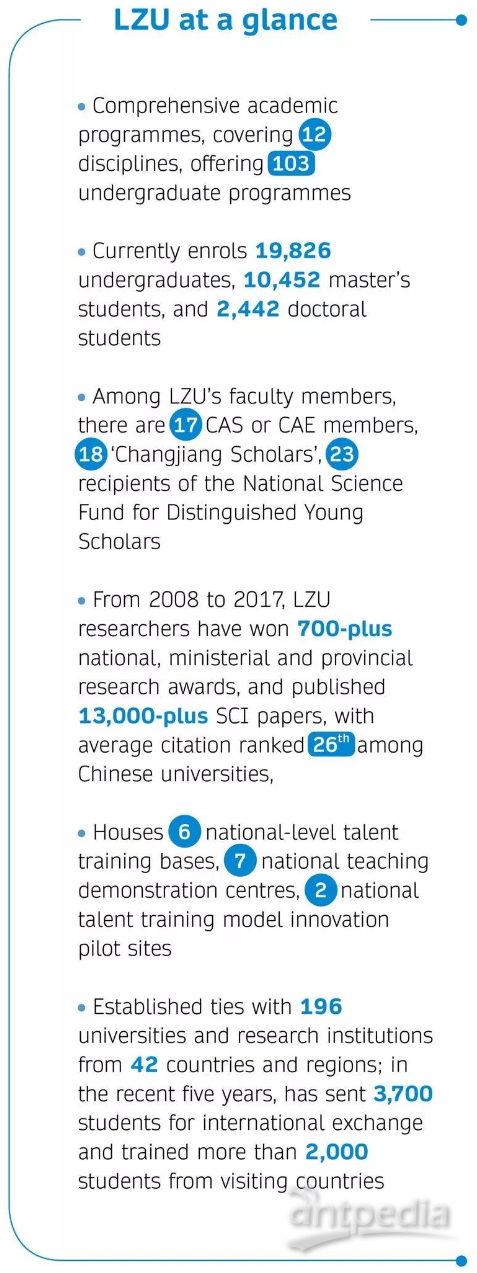
原文:https://www.nature.com/articles/d42473-019-00242-0
Blazing a trail
A conversation with Yan Chunhua, Ph.D., President, Lanzhou University
What is LZU’s background?
LZU is representative of the growth of higher education in northwest China. The university is situated in the country’s hinterland, where socioeconomic development lags, and cultural and natural environments differ from those in the east of China. It has faced hardship since its beginning with issues such as the lack of experienced faculty members and staff, inadequate funding, and a rather closed research environment. But we survived, growing from a small-scale, liberal, arts-focused provincial university into a multidisciplinary research university. Our mission is to revitalize northwest China and blaze a path for building quality universities in China’s under-developed regions.
What are LZU’s unique competitive edges?
We are a symbol of northwest China, playing an invaluable role in enlightening and promoting development in the region. Western China is relatively under-developed, but its unique geography, natural resources and industry have created research opportunities. The region’s deserts, brushland, plateaus and glaciers, along with sand movement, drought, and alpine climate are all the subject of revealing studies. The artefacts discovered in Dunhuang, and relics of the ancient Silk Road civilization shine a light on the present. With these resources, we have developed research strengths in ecology, grassland study, geoscience and atmospheric sciences, as well as Dunhuang study and ethnology. By linking field data with theories, real-world problems with cutting-edge technologies, and local development with national strategic needs, we have made a series of breakthroughs. According to the Nature Index annual table released in 2019, we are ranked 17th among Chinese universities.
What do you hope to achieve during your tenure?
The national Belt and Road Initiative, and being selected into the national ‘double first-class’ initiative have brought new opportunities to LZU, a century-old university. To become a world-class institution, we have set up a three-step development plan, with milestones planned for 2020, 2022, and 2025. Our plans encompass enhancing academic programmes, fostering talents, building faculty teams, research capacity, international collaboration, university management and culture. Particularly, for academic programmes, we will continue strengthening our specialities and fundamental sciences, while developing interdisciplinary subjects and medicine.
These improvements will be enabled by reforms to our human resources management and academic management systems, performance assessment and resource allocation systems, research instrument and platform sharing mechanisms, and the link integrating medical teaching, research and services. I hope these efforts will improve our research capacity and societal impact, and elevate education quality for greater global influence.
How do you accelerate translation of research results?
To increase the impact of technology transfer and better serve society, we have established a system to effectively translate research results. With new regulations to manage commercialization, we have simplified the process and improved services for technology application. The new process has clarified the allocation of profits and maximized benefits for research teams. Meanwhile, research commercialization has become a crucial factor in performance evaluation and promotion, which has dramatically stimulated interest in conducting translational research.
We have also set up an intellectual property and technology transfer centre, with a professional team offering one-stop services for technology transfer, and identification and promotion of intellectual property. We match results with industrial needs, facilitate negotiations, contract drafting, and legal services for licensing and profit allocation. These measures have helped progress research results toward application. Successful cases include a synthesized chemical for pharmaceutical use, a flotation reagent used by a mining company, and co-development of drugs with biotech companies.
Outline your ideas to enhance faculty teams?
Talented faculty members are our core resource and a priority investment area. With our geographic location considered a drawback by some, our strategy for attracting and retaining talent is to lure people with high-quality research programmes and career development platforms around our specialities. We have constructed interdisciplinary academic clusters, based on our ‘double first-class’ subject areas in chemistry, ecology, grassland and atmospheric studies, to encourage resource sharing, coordinated development and innovation. With these robust competitive platforms, coupled with policy and funding support, we hope to attract top talents to enhance our faculty teams.
We also focus on fostering excellence, offering on-the-job training and international exchanges and research collaboration opportunities to young faculty members. A series of initiatives, targeting young researchers, teachers and postdocs, complement talent programmes for academic leaders to form a multi-level talent support system.
We are also improving our support and service systems, offering sufficient start-up funds and supplementary services, ensuring a friendly research and living environment. With a performance-based compensation and promotion system, we want to motivate our researchers and inspire their creativity.
How could LZU become a more global force?
In the last 30 years, LZU has established partnerships with nearly 200 universities in 42 countries and regions, making links across five continents. We will integrate our internal and external resources to build a well-structured global collaboration network. The focus will be on deepening collaboration in research, student exchange and talent sharing with world-class universities, while strengthening dialogue and collaboration with universities in countries along the ‘Belt and Road’.
We will integrate globalization into classroom teaching and practical training, offering opportunities for students to study abroad at leading institutions, and internship opportunities at multinational companies and international organizations. We will also enhance our international student training programmes. Similarly, efforts will be made to offer more overseas training for faculty members and invite more talented scholars to give talks or work at LZU. International collaboration in research is another essential aspect. We plan to build international research teams and participate or lead international big science projects. By working with international academic organizations, we also hope to organize some influential conferences to boost our profile.
原文:https://www.nature.com/articles/d42473-019-00241-1
-
焦点事件

-
焦点事件

-
焦点事件

-
焦点事件

-
焦点事件

-
焦点事件

-
焦点事件

-
焦点事件















